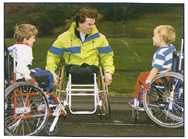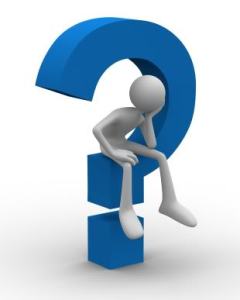Freemasonry: The Craft
For centuries, millions of men of every race, color, creed, and political persuasion throughout the world have found in the Symbolic Lodges of Freemasonry the light to guide their search for answers to eternal questions: What is the meaning of life? The nature of God and man?
Freemasonry is a system of morality, veiled in allegory, illustrated by symbols. It is not a religion but religious in character, it is a philosophy of ethical conduct which imparts moral and social virtues and fosters brotherly love. Its tenants have endured since man turned the first pages of civilization. They embody the understanding by which man can transcend ordinary experience and build “a house not made with hands” in harmony with the Great Architect of the Universe.
Yet Freemasonry can never conflict with a man’s relationship to God or fellow man. Sectarian religious or partisan political discussion in a lodge is strictly prohibited. Every Mason stands equal among his brothers, regardless of walk of life, and none is turned away for financial need.
The purpose of the Ancient Craft of Freemasonry is to unfold a message where “truth abides in fullness,” invoking greater understanding of the inward life and spirit of fellowship in which every Mason can also lead a better outward life.
Brotherhood at Work
Freemasonry has been characterized as a fraternity devoted to high ideals and admirable benevolence. Community service and charitable work are, in fact principal Masonic activities.
Easily the best known is the world’s largest single charitable institution, the Shriners Hospitals for Crippled Children and Burns Instituted, which are located throughout Canada, the U.S. and Mexico.
Other Masonic bodies and support their own statewide and national foundations for research, teaching, and treatment of rehabilitation services for children with learning or speech disorders, cancer, visual problems, and need of dental restoration. Ohio Freemasons also support the Ohio Special Olympics.
Masons everywhere assist distressed brother Masons and their families, including the support of their own Ohio Masonic Home. Masons serve as community volunteers and quietly extend help for countless thousands – from providing a child with shoes to assisting the handicapped.
Altogether, the budgets for these community services exceed two million dollars per day, which Masons support without regard to the Masonic affiliation of their recipients. With this spirit of working together to serve works well, indeed.
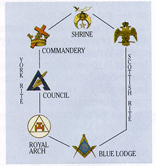
A Progressive Science
Once attaining the degree of Master Mason in his symbolic or “Blue” Lodge, a Mason steps onto a broad vista of opportunity for fellowship and advancement.
First, concordant bodies of the York Rite and the Scottish Rite offer ritual instruction for advance degrees. Then, every Shriner is a Mason first…as are members of other Masonic groups, each serving a particular need or interest.
Advancement through these concordant bodies not only invited participation in this Masonic network, but also promotes a more comprehensive understanding of its system of ceremonies, doctrines, and symbols.
A statewide Grand organization governs every Masonic body, and all but the Blue Lodge have national governing councils as well. These offer further opportunity for growth and responsibility.
No Mason is required to advance beyond his Blue Lodge or participate actively in its ritual or business affairs, but those who do so find personal fulfillment in the rewards of public speaking, teaching, community work, and even music and dramatic arts.
Whether their commitments are to Masonic ritual, study, or organizational and charitable work, most active Masons simply speak of the camaraderie among trusted friends and a satisfying sense of purpose.
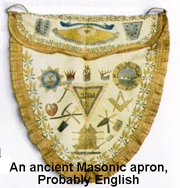
Ancient Traditions
Through its heritage in antiquity is unmistakable, modern speculative Freemasonry was founded more recently upon the structure, ceremonies, and symbolism of the lodges of operative or working freeman stonemasons, who built the magnificent Medieval Gothic structures throughout much of Europe and England.
Dated in 1390 A.D., the Regius Poem details the charter of a lodge operating in the 900s A.D. “Masonry” then meant architecture and encompassed most of the arts and sciences. Because lodges held knowledge as competitive secrets, only trusted, capable companions were instructed in the craft – and then only by degrees orally and through symbols, because of widespread illiteracy.
In the late Renaissance, lodges of freemasons began to accept as speculative masons those educated men who were attracted by the elegance of Masonic traditions for philosophic expression. In time, they were passed into the inner circles.
Thus, the framers of speculative Freemasonry began to describe a code of conduct through the symbolic nature of architecture and the stonemason’s craft. Signaling modern speculative Freemasonry, the first Grand Lodge was chartered in 1717. Constituent Symbolic Lodges were soon established throughout the world.
The first Lodge in the Colonies was chartered in Boston in 1733, and the first Lodge in Ohio at Marietta in 1816.
A Family Affair
The Blue Lodge is the bedrock of the Masonic family, yet there are several appendant organizations which a Mason’s family members can join to share many more of their common programs and activities.
Family-orientated activities include a range of social and entertainment programs, family outings, and community service projects, as well as numerous occasions for statewide or regional travel.
Among the appendant groups for adults, both men and women may be welcome as members, but women typically hold the principal offices. These groups include, among others, the Order of the Eastern Star, Order of Amaranth, and Ladies Oriental Shrine.
Groups for young people build self-esteem and prepare them for citizenship through successful experience with responsibility and leadership. Masonic youth groups include the Order of Rainbow for Girls, the Order of Job’s Daughters for young women, and the Order of DeMolay for young men.
With many opportunities for growth and friendship, these family-centered groups typically develop active social calendars, so that the “Masonic family” truly is a family affair.
Ask Yourself
Among millions of Masons, not one was lawfully invited to apply for membership. Our code of conduct prevents it. Thus, no faithful Mason can invite you. Any Mason can obtain a Petition for the Degrees of Masonry for you, but you must ask for it – and for good reason.
You must first ask yourself if you’re suitably prepared to enter the “gentle craft of Masonry” … to become a brother in the world’s most exclusive fraternal order. Few men are intellectually or spiritually prepared to understand or appreciate even the more apparent meanings of Masonry.
Do you reflect on the nature of Man’s existence and your obligations to God, your family, and yourself?
If such ethical and moral questions hold little interest for you, then you will gain little benefit from the teachings of the Craft. But, if you seek a more meaningful quality of life – and the spirit of charity and good fellowship which flows from it – then Freemasonry has much to offer.
We want you to know what we believe, how we act, and what we do … and, then, should you become a Mason, to be proud to be our Brother and to participate in our work. Only those who desire membership because of their favorable impression of us should seek a petition. That’s why you must “ask yourself.”
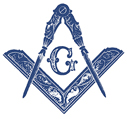
What we Ask of You
Any man who is nineteen year of age or older and of good moral character, who comes well recommended, and who believes in a Supreme Being may petition to become a Freemason.
Two Important Questions:
Is Freemasonry a religion?
No. Freemasonry is neither a religion, nor does it require a religious affiliation. However, Masons worship in congregations of their choice. Some are ordained priests, ministers, or rabbis; many serve in lay capacities, and others have no affiliation. With origins in post-Reformation England, Freemasonry’s allegories and rituals are rooted in Judeo-Christian tradition. They exemplify mankind’s universal experience and inculcate an admired moral and ethical value system. With respect to religion, Freemasonry simply teaches the “Fatherhood of God” and the “Brotherhood of Man.”
Is Freemasonry a “secret” society?
No. Freemasonry is a fraternity of men who are proud to be knows as Masons. Since our inception, the world had known of speculative Freemasonry and its work. Freemasonry does, however, have some secrets, all extending from historic tradition. Our modes of recognition, opening and closing ceremonies, and rituals for conferring the Degrees of Masonry are our only secrets. Thousands of works discussing Masonic history, traditions, craft, and proceedings are widely available to the public.
Freemasonry’s Mission Statement
Freemasonry provides opportunities for sincere, honest, forthright men of all walks of life to contribute to the improvement of themselves, their families and their communities. Through our Masonic brotherhood, we reaffirm our dedication and unity to brotherly love, relief and truth, faith, hope and charity, the values that make America great.

